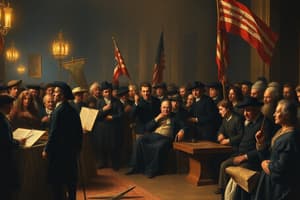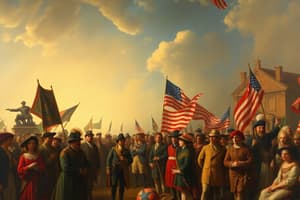Podcast
Questions and Answers
What was the main reason the Proclamation of 1763 angered the colonists?
What was the main reason the Proclamation of 1763 angered the colonists?
- It required them to pay for military protection.
- It imposed taxes on imported goods.
- It restricted their movement west of the Appalachian Mountains. (correct)
- It favored British merchants over colonial businesses.
How did the French and Indian War financial situation influence British taxation on the colonies?
How did the French and Indian War financial situation influence British taxation on the colonies?
- Colonists were seen as wealthier than the British.
- The war led to less enforcement of colonial laws.
- Britain decided to reduce taxes on the colonies.
- British officials believed colonists should contribute to paying off the war debt. (correct)
What was a significant consequence of the Stamp Act on colonial sentiment?
What was a significant consequence of the Stamp Act on colonial sentiment?
- It resulted in a decrease in smuggling activities.
- It made colonists more supportive of British taxation.
- It had no impact on colonial attitudes towards British rule.
- It united the colonies through the Stamp Act Congress. (correct)
Which act specifically taxed everyday paper items purchased by the colonists?
Which act specifically taxed everyday paper items purchased by the colonists?
What was the primary method of protest adopted by the colonists in response to British taxes?
What was the primary method of protest adopted by the colonists in response to British taxes?
What key idea was promoted by the Townshend Acts regarding law-making authority?
What key idea was promoted by the Townshend Acts regarding law-making authority?
How did the Sons of Liberty primarily respond to British policies?
How did the Sons of Liberty primarily respond to British policies?
What was a common characteristic of the early responses by colonists to British taxation?
What was a common characteristic of the early responses by colonists to British taxation?
What did the colonists mean by their slogan, 'No taxation without representation'?
What did the colonists mean by their slogan, 'No taxation without representation'?
Which event is associated with the act of tarring and feathering?
Which event is associated with the act of tarring and feathering?
How did the image created by Paul Revere contribute to colonial unity?
How did the image created by Paul Revere contribute to colonial unity?
What was the primary cause of the Boston Tea Party?
What was the primary cause of the Boston Tea Party?
What was one of the effects of the Coercive Acts after the Boston Tea Party?
What was one of the effects of the Coercive Acts after the Boston Tea Party?
What did colonists commonly call the Coercive Acts?
What did colonists commonly call the Coercive Acts?
What was the main intention behind the propaganda image created by Paul Revere?
What was the main intention behind the propaganda image created by Paul Revere?
Why did the colonists feel justified in protesting against the Tea Act?
Why did the colonists feel justified in protesting against the Tea Act?
Flashcards
Salutary Neglect
Salutary Neglect
The British government's decision to not strictly enforce laws in the American colonies, allowing for a degree of self-governance.
Stamp Act
Stamp Act
A tax imposed by the British government on all paper goods purchased by colonists, including licenses, newspapers, and playing cards.
Sugar Act
Sugar Act
A tax placed on sugar and molasses imported from non-British companies, designed to generate revenue for the British crown.
Townshend Acts
Townshend Acts
Signup and view all the flashcards
Boycott
Boycott
Signup and view all the flashcards
Stamp Act Congress
Stamp Act Congress
Signup and view all the flashcards
Sons of Liberty
Sons of Liberty
Signup and view all the flashcards
Proclamation of 1763
Proclamation of 1763
Signup and view all the flashcards
No Taxation Without Representation
No Taxation Without Representation
Signup and view all the flashcards
Propaganda
Propaganda
Signup and view all the flashcards
Boston Tea Party
Boston Tea Party
Signup and view all the flashcards
Tea Act
Tea Act
Signup and view all the flashcards
Coercive Acts
Coercive Acts
Signup and view all the flashcards
Study Notes
Road to Revolution Review
- Boycott: Refusal to buy products or services as a form of protest.
- Proclamation of 1763: Restricted colonists from moving west of the Appalachian Mountains. Colonists felt this was a plot to keep them under strict English control.
- Salutary Neglect: English government's decision to not enforce laws.
- French and Indian War Impact: England's debt led to taxing colonists, who saw themselves increasingly as Americans rather than Englishmen, thus rejecting taxation without representation.
Key Acts and their Impact
- Stamp Act: Tax on all paper goods (licenses, newspapers, etc.) directly impacting colonists. Considered a direct tax and angered colonists who felt this money was being taken from their pockets.
- Sugar Act: Taxed sugar and molasses imported by colonists. Colonial governments sent formal protests to Parliament.
- Townshend Acts: Taxed imported goods such as glass, lead, paint, paper, and tea. Colonists also felt this was an infringement on their rights and a form of taxation without representation, similar to the Stamp Act.
Colonial Responses
- Boycott: Refusal to buy British goods.
- Stamp Act Congress: Colonists united to appeal to Parliament.
- Sons of Liberty: Secret organization protesting British taxes and laws. Protests included tarring and feathering.
Taxation Without Representation
- Colonists believed in the right to vote on taxes, as Englishmen did, and argued that since no colonists were in Parliament, they had no say in the matter. They cried "No taxation without representation!"
Propaganda and the Boston Massacre
- Propaganda: Exaggerating facts to gain support for a cause.
- Paul Revere's portrayal: Image of the Boston Massacre meant to convince colonists to unite against British rule. Portrayed British soldiers as aggressors who killed helpless Colonists, aimed at angering and uniting Colonists against their perceived oppressors.
Boston Tea Party Cause and Effect
- Cause: Tea Act lowered British tea costs to force American colonists to buy only British tea, leading to resentment and protests against taxation without representation.
- Effect: Coercive Acts (Intolerable Acts): Closed Boston Harbor, restricted town meetings in Massachusetts, and required colonists to house British troops, as punishment for the Boston Tea Party. The Acts punished colonists for their protest against taxation without representation.
Studying That Suits You
Use AI to generate personalized quizzes and flashcards to suit your learning preferences.




